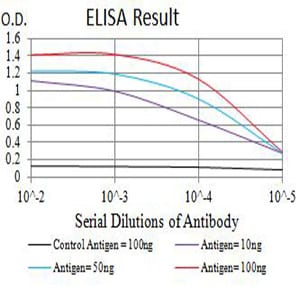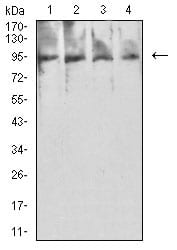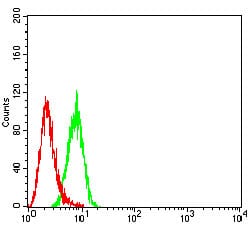


| WB | 1/500 - 1/2000 | Human,Mouse,Rat |
| IF | 咨询技术 | Human,Mouse,Rat |
| IHC | 咨询技术 | Human,Mouse,Rat |
| ICC | 技术咨询 | Human,Mouse,Rat |
| FCM | 1/200 - 1/400 | Human,Mouse,Rat |
| Elisa | 1/10000 | Human,Mouse,Rat |
| Aliases | FOLH1; PSM; FGCP; FOLH; GCP2; mGCP; GCPII; NAALAD1; NAALAdase |
| Entrez GeneID | 2346 |
| clone | 2D10E10 |
| WB Predicted band size | 84.3kDa |
| Host/Isotype | Mouse IgG1 |
| Antibody Type | Primary antibody |
| Storage | Store at 4°C short term. Aliquot and store at -20°C long term. Avoid freeze/thaw cycles. |
| Species Reactivity | Human |
| Immunogen | Purified recombinant fragment of human PSMA (AA: extra 44-177) expressed in E. Coli. |
| Formulation | Purified antibody in PBS with 0.05% sodium azide |
+ +
以下是3-4条关于PSMA抗体的参考文献及其简要概括:
1. **文献名称**: *"Prostate-Specific Membrane Antigen-Based Therapeutics for Advanced Prostate Cancer"*
**作者**: Evans MJ, Smith-Jones PM
**摘要**: 该文献综述了PSMA靶向治疗的进展,重点讨论了基于抗体和放射性配体的治疗策略(如177Lu-PSMA-617),通过临床前和临床试验数据证明其在转移性去势抵抗性前列腺癌中的有效性和安全性。
2. **文献名称**: *"J591 Antibody-Delivered Radiotherapy for Prostate Cancer"*
**作者**: Tagawa ST, et al.
**摘要**: 研究报道了一种靶向PSMA的单克隆抗体J591与放射性同位素(如177Lu)偶联的疗法。I/II期临床试验显示,该疗法可显著抑制肿瘤生长,且副作用可控,为晚期前列腺癌患者提供了新选择。
3. **文献名称**: *"PSMA-Targeted Bispecific Antibodies for Redirecting T Cell Cytotoxicity"*
**作者**: Friedrich M, et al.
**摘要**: 研究开发了一种双特异性抗体,同时靶向PSMA和T细胞表面CD3分子,在体外和小鼠模型中成功激活T细胞并诱导前列腺癌细胞特异性杀伤,展示了免疫治疗的新方向。
4. **文献名称**: *"Imaging of PSMA Expression in Prostate Cancer with 89Zr-Df-IAB2M Anti-PSMA Minibody"*
**作者**: Pandit-Taskar N, et al.
**摘要**: 该研究利用89Zr标记的微型抗体(IAB2M)进行PET成像,验证了其在前列腺癌患者中高灵敏度和特异性检测PSMA表达的能力,为个体化治疗提供了影像学支持。
**注**: 以上文献为示例性质,实际引用时需核对具体期刊和作者信息。近年研究可重点关注《Nature Reviews Urology》《Clinical Cancer Research》等期刊。
Prostate-specific membrane antigen (PSMA), also known as glutamate carboxypeptidase II (GCPII) or folate hydrolase 1 (FOLH1), is a transmembrane glycoprotein expressed predominantly in prostate epithelial cells. Structurally, it contains a short intracellular domain, a transmembrane region, and a large extracellular enzymatic domain with zinc-dependent hydrolase activity. While its physiological role remains incompletely understood, PSMA is implicated in folate metabolism, nutrient uptake, and cell signaling pathways.
PSMA gained prominence due to its overexpression in prostate cancer cells, particularly in advanced, metastatic, or androgen-resistant cases. Its expression correlates with tumor aggressiveness, making it a valuable biomarker and therapeutic target. Notably, PSMA is not exclusive to prostate cancer; low levels are found in some healthy tissues (e.g., salivary glands, kidneys), and aberrant expression occurs in other cancers, including renal, bladder, and glioblastoma.
In diagnostics, PSMA-targeted antibodies enable advanced imaging techniques like PSMA-PET scans to detect metastases. Therapeutically, anti-PSMA antibodies are engineered into antibody-drug conjugates (ADCs), bispecific antibodies, or CAR-T cell therapies. Radioligand therapies (e.g., ¹⁷⁷Lu-PSMA-617) exploit PSMA's internalization capability to deliver targeted radiation. Challenges include managing heterogeneous PSMA expression, off-target effects, and resistance mechanisms. Ongoing research focuses on optimizing antibody affinity, reducing toxicity, and expanding applications to non-prostate malignancies.
×